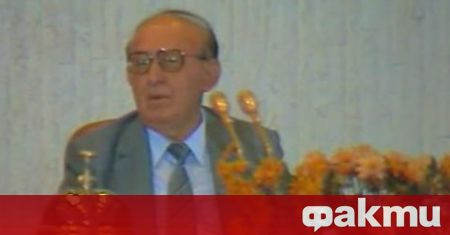On August 5, 1998, Todor Zhivkov died. The same day, the government announced that it was changing the money.
He was Chairman of the State Council of the People’s Republic of Bulgaria (1971-1989), First Secretary (since 1954) and General Secretary (1981-1989) of the Central Committee of the Bulgarian Communist Party. By decision of the Central Committee of the Bulgarian Communist Party, he was removed from the Central Committee of the Bulgarian Communist Party (December 8, 1989); expelled from the Bulgarian Communist Party (December 13, 1989).
On September 4, 1992, the Supreme Court of Bulgaria sentenced him to 7 years in prison for illegally distributing money for the representative needs of the state apparatus, for housing, cars, etc. Sentenced to return 21,010,380 leva to the state.
On February 9, 1996, the General Assembly of the Criminal Chambers of the Supreme Court recognized Zhivkov’s status as a former head of state and terminated the case against him.
He died on August 5, 1998 at 8:05 p.m. after a three-week cerebral coma.
Todor Zhivkov was urgently admitted to the “Lozenets” hospital on July 8, 1998, bTV recalls. He had a severe viral infection, high fever and right-sided bronchopneumonia. BTA officially announced his death about 12 hours later.
The government rejected the insistence of his family and the Bulgarian Socialist Party to bury him with state honors, because “in recent years he has not participated in public life and there are pending lawsuits against him“. Many noted that a large part of the crimes committed during his rule of the country remained uninvestigated.
The coffin with the body of the former first in the state was placed on the steps to the left of the so-called Royal Palace – opposite the former mausoleum of Georgi Dimitrov. An hour later, its lid was closed and he was loaded into the hearse. A crowded procession followed it to the cemetery.
A huge queue formed around 1:30 p.m. in front of the ritual hall of the Central Sofia Cemetery. For more than three hours, Zhivkov’s closest people accepted condolences. The first to say goodbye to the deceased was his granddaughter Zhenya Zhivkova, then the others.
Todor Zhivkov was laid to rest in plot 10 next to his wife, Dr. Mara Maleeva.
World agencies quickly spread the news of Todor Zhivkov’s death. The first to react was the German DPA, which referred to the newspaper “Noshten Trud“. Agencies such as Reuters, France Press and TASS used as sources the doctors at the then Government Hospital “Lozenets“, as well as Bulgarian radio stations. The most extensive material about his death was published by the Associated Press.
Todor Zhivkov was born on September 7, 1911 in the village (now the city) of Pravets. He graduated from junior high school in today’s Botevgrad. Since 1929 was a printing worker, in 1930 he joined the youth communist movement, and in 1932 he joined the Bulgarian Communist Party.
In 1935 he completed his military service as a laborer in the Sixth Company of the First Infantry Work Battalion in Sofia. In 1939 he settled in Sofia and graduated from the secondary printing school, after which he started working as a letterpress maker at the State Printing House in Sofia.
From July 1938 to November 1942 he temporarily resided in the villages of Duskot, Lesichevo, Govedartsi, where his wife Mara Maleeva was assigned as a district doctor.
After September 9, 1944, Zhivkov led the establishment of the so-called “people’s militia” in Sofia. From 1945 entered the leadership of the Bulgarian Communist Party, and in the period 1948-1949 headed the most influential city organization of the Bulgarian Communist Party in Sofia.
His rise to the forefront occurred during the years of Stalinism, but he received a real opportunity to take a leading position only after Stalin’s death. With the help of Nikita Khrushchev, he replaced Chervenkov as First Secretary of the Central Committee of the Bulgarian Communist Party in 1954, and after the April Plenum of 1956, he established himself as the first, and later the only, party leader.
Todor Zhivkov was the ruler who was in power in Bulgaria the longest. He insisted on following the Soviet model as closely as possible and on establishing the closest relations between Bulgaria and the Soviet Union, a proposal that was made in 1963. He wanted Bulgaria to become the 16th republic of the USSR.
He showed an enviable ability to maintain his power both thanks to Soviet support and through his own political qualities – he periodically changed his closest aides, bribed some social groups and kept others in subjection, became the initiator of numerous economic reforms. He was the initiator of the forcible renaming of the Bulgarian Turks with the aim of their assimilation (the so-called “revival process”).
Zhivkov was forced to resign as General Secretary of the Central Committee of the Bulgarian Communist Party, first on November 9 before the Politburo, and then on November 10, 1989 before the Central Committee of the Bulgarian Communist Party.
On November 10, 1989, he was thanked and his privileges were preserved, but on December 13, 1989, he was expelled from the Bulgarian Communist Party. On January 18, 1990, Zhivkov was placed under house arrest, and in 1992 he was tried for abuse of power. On September 4, 1992, he was sentenced to seven years in prison. However, the sentence was replaced with house arrest. This sentence was overturned by the Supreme Court on February 9, 1996.
Cases were brought against him for the forced change of names of Bulgarian Turks, for the camps, for granting uncollectible loans and aid to developing countries and communist parties, as well as for supporting the international communist movement.
